Phase 1 Research
On 19th December I carried out Phase 1 of the research. This comprised of an informal visit to the class to give them an overview and ascertain who would be interested. I carried out the actual research on the following day enabling them time to reflect and digest the information on the Consent Form. The following are the slides I used in the workshop.
Initially, I was to carry out my research with Training & Development students but as they were behind on their curriculum I decided to find an alternative course. Therefore, I carried out my research with 8 business students. They were very enthusiastic and I explained what it entailed highlighting that participation is entirely voluntary. I gathered e-mail addresses of the interested students and e-mailed them the pre-questionnaire using Google Forms.
Whilst the group had no instructional design knowledge the presentation included Viewpoints learner engagement cards (University of Ulster, 2012). However, to ensure simplicity I felt when completing the workshop that while these cards were beneficial for brainstorming it may have been too overwhelming and technical for the particular audience. Therefore, the focus was on the collaboration between the adult learners and the researcher.
The artefact was developed over the Christmas period and in February the final stage of Phase 1 was carried out. The following discusses the workshop.
Workshop
Students were very co-operative during the workshop and despite their lack of instructional design experience they were very willing to participate and made some very interesting and relevant points. Obviously some students were more vocal than others.
Here are the slides I used in the
During the workshop we finalised some learning outcomes/objectives and interestingly what came across during the discussion was to also include skills on gaining confidence. Here is the flipchart used to capture their ideas:
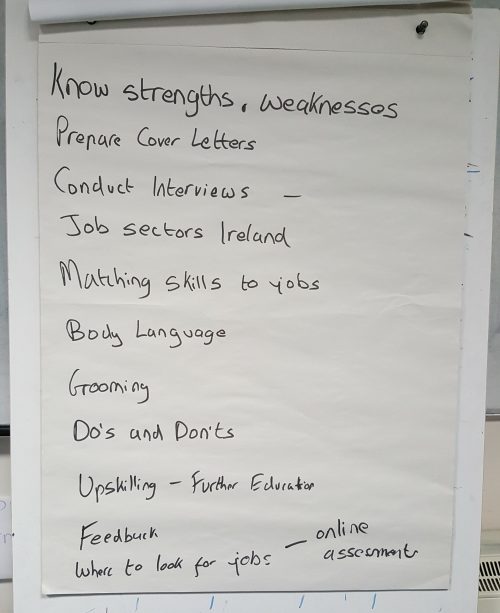
I showed them three different types of examples for the design as outlined below:
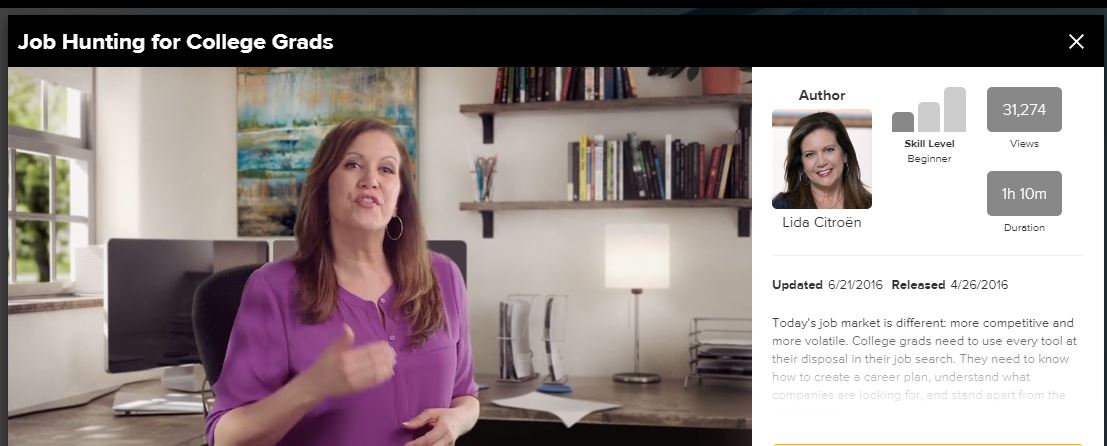
Example 1
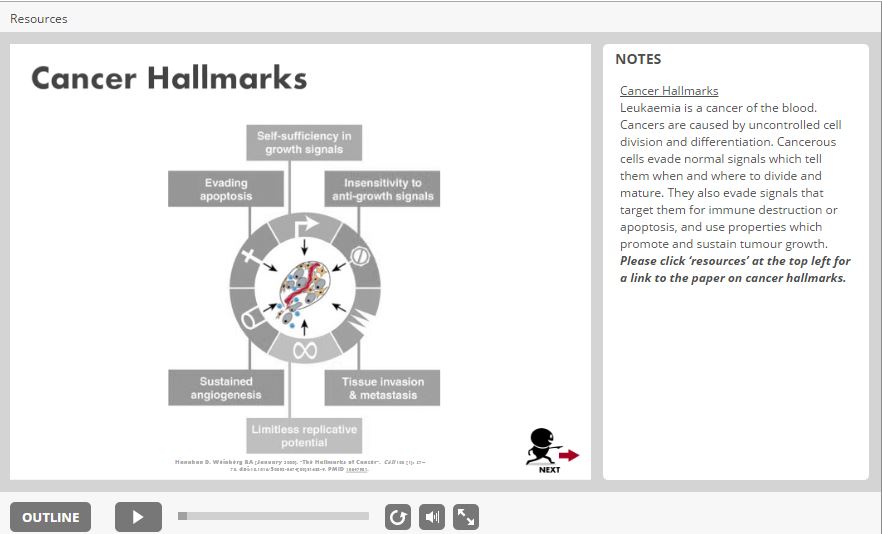
Example 2
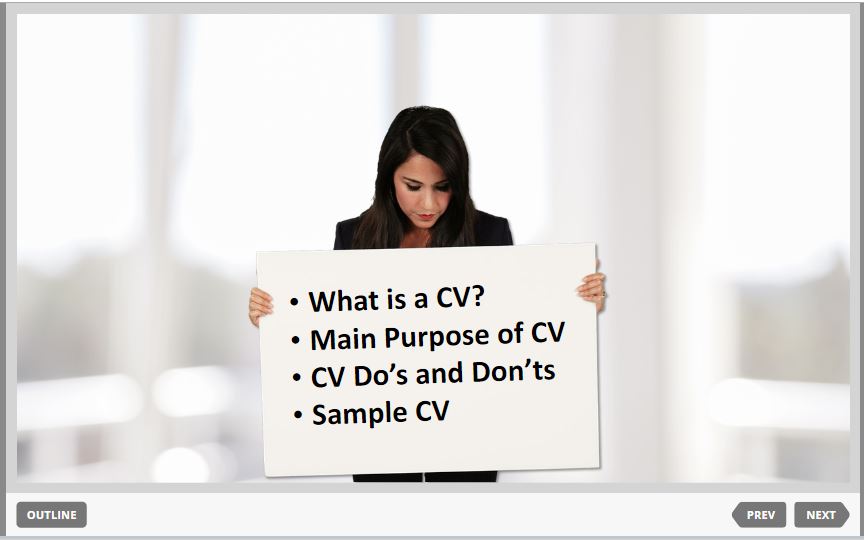
Example 3
Students were drawn to Example 2 but with a variation of Example 3 and 1 (1 was their least favourite). “Varied and visual” was one response. The idea of having sound with the option of turning it on or off was also suggested.
For the introduction a video of the tutor introducing themself was suggested giving an overview of the course and indicating that they were there there to help. They felt that having a real person in the video would be a good way of gaining attention while creating reassurance for those who are new to online learning. I brought up the comment that was made about having a person available to answer questions and creating a social media presence was suggested and a drop in workshop for those who would like to have face to face.
Facebook seemed popular and they liked the idea of interacting with other students.
I was also impressed by the suggestion of chunking information.
Questionnaires
The following will compare answers from some of the most important questions in the pre and post questionnaires. It is important to note that 8 learners responded to the pre-questionnaire and only 6 responded to the post-questionnaire. Subtle reminders were sent to the two learners but for ethical reasons their non-response was respected. This concurs with existing research where some learners may resist sharing their views or may feel uncomfortable (Blondy, 2007).
In your opinion, what are the advantages of online learning? (8 responses)
Pre-Questionnaire
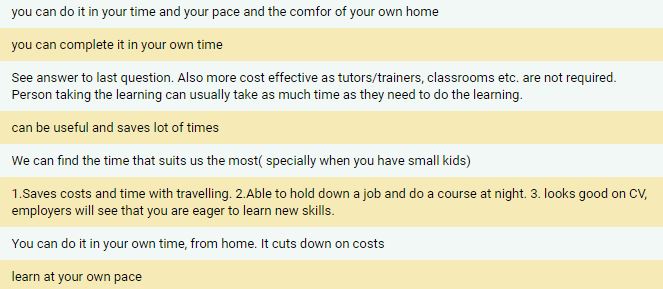
Saving time was the most common advantage.
In your opinion, what are the advantages of completing the redesigned online module? (6 responses)
Post-Questionnaire
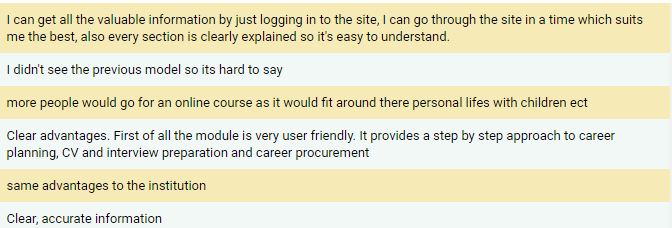
Overall responses are positive. Interestingly, only two referred to time even though this was a clear unanimous advantage in the pre-questionnaire question.
In your opinion, what are the disadvantages of online learning? (8 responses)
Pre-Questionnaire
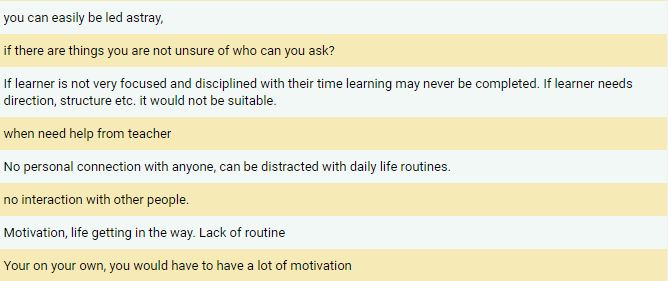
Lack of motivation and isolation are key themes emerging from the disadvantages.
In your opinion, what are the disadvantages of completing this redesigned online module? (6 responses)
Post-Questionnaire

Three learners don’t see disadvantages which is positive. However, one learner states time consuming and it would be interesting if this could be probed further.
If you had the choice of completing a Career Planning course online or in the classroom which would you choose and why? (8 responses)
Pre-Questionnaire
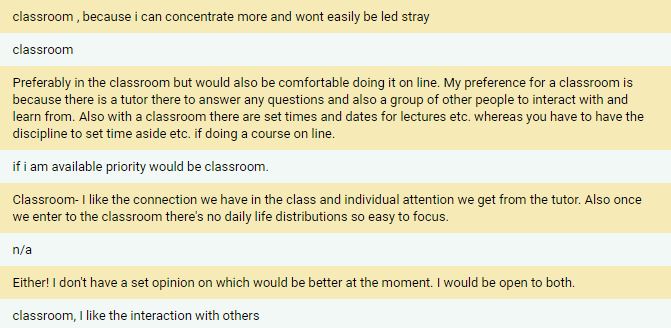
Six students had a strong preference to classroom with one student replying n/a. The student who replied that they would be comfortable in doing the Career Planning online (but had preference to classroom) had already completed an online course. Furthermore, they rated their level of self-directedness as good.
Post-Questionnaire
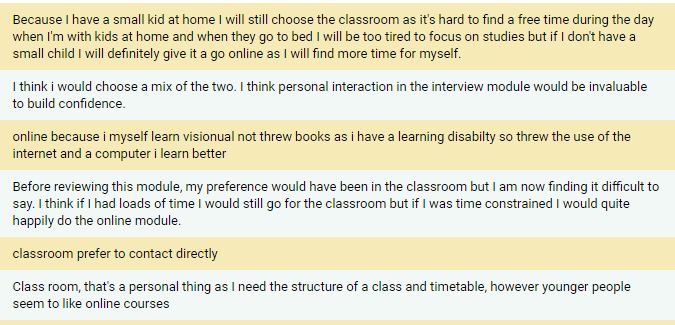
There has been a noticeable change in the results. While not all are opting for online learning there is a significant increase in their views as a response of their involvement and input.
As a student, how would you rate your level of self-directedness? In other words, do you take control of your own learning as opposed to being dependent on the teacher. (8 responses)
Pre-Questionnaire
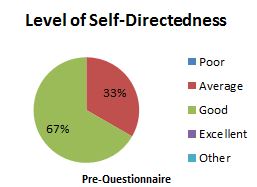
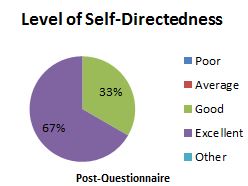
There has been a significant increase in the level of self-directedness. It is important to note that each learner increased their level of self-directedness in comparison to the pre-questionnaire. 67% have gone from good to excellent and 33% from average to good.
All students were comfortable with using technology (computer and internet) so this was not an issue. This complies with research from Amárach where internet use in Ireland is high in comparison to some of our European counterparts (Amárach, 2014).
An interesting comment made by one of the students which will be addressed at the workshop is “i think if you are doing an online course there should be someone available on certain days to answer any questions that the student is unsure of”. The lack of a person present seems to be a common theme and when designing the course we need to address this.
Focus Group
Overall, the group found the experience to be very positive. One learner stated “gets you thinking really doesn’t it….what you mightn’t have thought about before”. Another learner stated “we learnt you realise what you don’t like or what way you want to learn yourself or what would help you to learn better”.
Learners Involvement in the Designing Process
Their response to learners being involved in the designing process concurred with their responses in both questionnaires. They strongly felt that learners should be involved. One learner recalled a story on a new shop layout in her previous employed. It was designed only by architects. However, they omitted some important elements and the learner felt that if staff were involved this would not have happened. As noted by the learner “when you’re the person who is going to be doing it then I think it is definitely well worth being involved to design the course”
Characteristics Required by Adult Learner in Online Learning
The following are characteristics the group deemed necessary for adult learners to take part in online learning:
- Discipline
- Motivation
- Ambition
- Some basic computer skills
- Focus
- Some kind of an interest in what they are doing
It is interesting to note that motivation, interest in what they are doing and discipline correlate with Knowle’s andragogical characteristics of adult learners (Knowles et al, 1998). However, self-directedness is not mentioned but it could be associated with discipline.
All learners felt that they had the necessary characteristics of online learning.
Changes in View of Online Learning
All learners felt that their views of online learning has changed. One learner stated that prior to her participation she as scared to even go near online learning. The rest of the learners in the group agreed with this statement. Furthermore, she enjoys the variety it offers e.g. audio, visual, text which will help the learner to understand better. She also noted that having the drop in workshop would also add to this so that you can meet someone if you have any problems.
Researchers Reflections
I was very impressed with the level of engagement, motivation and eagerness displayed by the group from Phase 1. Whilst I do not teach these students I am aware of the course they are studying and it is intensive and requires a lot of self-directedness and motivation. This is very evident amongst this group. As with any group, some learners are more vocal than others but each made valuable contributions. I was pleasantly surprised by their clued in approach to the design process e.g. chunking information, varied and visual, using a a video at the beginning with a real person to draw learners in, an option to have audio on/off, rewards, goals and the array of learning outcomes. Other good recommendations included the drop in workshop and using Facebook as a way of interacting.
Distractions seemed to be the major drawback to online learning for this group. However, it was not self-directedness. In fact, during the focus group they made the point that they are very self-directed. Has this intense course already taken them on the journey from passive to self-directed learner? At the same time, despite the self-directedness not all had a preference to online learning. Moreover, their level of self-directedness improved. As a group they appear to gel well and the social element is probably a factor.
References:
Amárach (2014). The Second UPC Report on Ireland’s Digital Future: Accelerating Economic Recovery. Retrieved June 9, 2016, from https://www.virginmedia.ie/pdf/UPC_2014_report.pdf
Anderson, M. B., & Swanson, A. G. (1993). Educating medical students: The ACME-TRI report with supplements. Acad Med, 68(4), S1-S46.
Blondy, L. C. (2007). Evaluation and application of andragogical assumptions to the adult online learning environment. Journal of interactive online learning, 6(2), 116-130.
Knowles, M., Holton, E., & Swanson, R. (1998). The Adult Learner. (5th ed). Texas: Gulf Publishing.
University of Ulster (2012). Viewpoints Resources. Retrieved June 07, 2016, from: http://wiki.ulster.ac.uk/display/VPR/Home
<p style=”margin-left:.5in;text-indent:-.5in”>Anderson, M. B., & Swanson, A. G. (1993). Educating medical students: The ACME-TRI report with supplements. Acad Med, 68(4), S1-S46.</p>